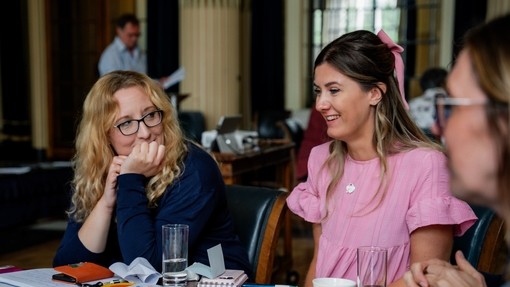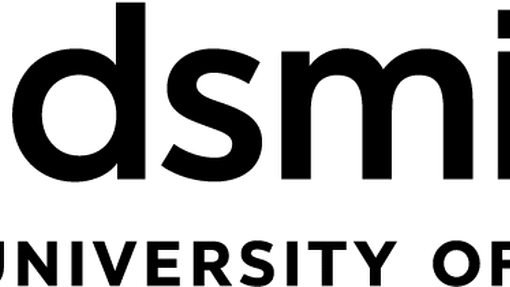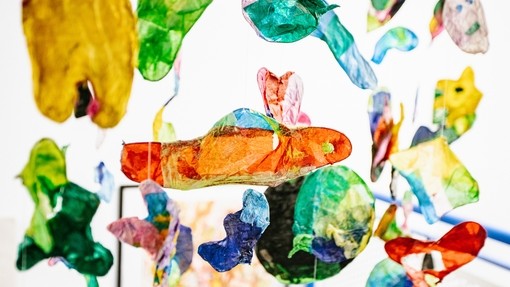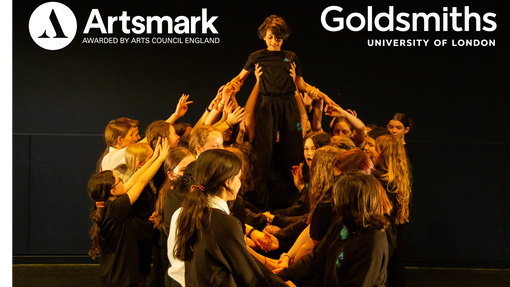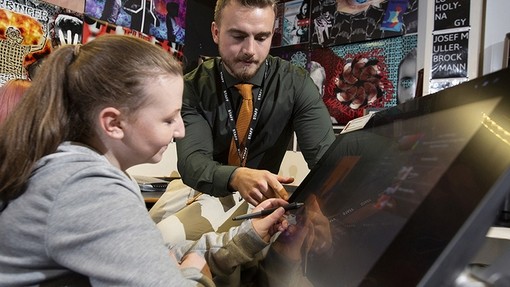
Five questions with Professor Page
At the start of the academic year our new delivery partner, Goldsmiths, University of London, began delivering Artsmark’s training and support offer to schools and settings. We’re thrilled to be collaborating with Goldsmiths, one of the finest research and teaching universities in the world with a fantastic reputation as a hub for creativity, arts and culture.
Their training programme is led by the wonderful Professor Tara Page. We’d love you to get to know her and her team a little better, so grab a brew and read our five questions with Professor Page.
1. Tara, tell us about yourself!
When I am asked what I do, my official reply is Professor of Pedagogy and Praxis. But I am also an artist, researcher and teacher.
I’ve worked in community arts, early years, primary, secondary and university arts education in Australia, Canada and the UK for over 20 years and in this time explored and developed my entangled artistic, research and pedagogic practices – always working the spaces between. I’ve also been a lifeguard, groundskeeper and swimming teacher – this seems random but it all involves teaching, learning and making. Find me on Instagram.
I have recently discovered pickled onion crisps! It is the simple things that are joyful, and I am adding these to my list!
2. What inspired Goldsmiths to partner with Artsmark?
Having worked initially in teacher education and schools for over 15 years in the UK, I already knew about the Artsmark Award. Many of our PGCE students, once working in schools, would share their experiences of Artsmark and how they felt they could take their learning from Goldsmiths into their schools’ journeys.
As soon as I found out Goldsmiths would be the new Artsmark delivery partner, I knew I’d be closely involved with the programme in my role. I started to do my own research and assessment of the Artsmark programme, through analysing documentation, reading online resources, completing the online module and through a consultation with the Arts Council’s Artsmark team and the Artsmark previous delivery partners - the Bridge organisations. This was a deep dive into the framework and the quality principles, and then how that is enacted and evidenced through the documentation of the Statement of Commitment and Statement of Impact.
A further dive (ah always a swimming teacher) into the Bridge training sessions, and I started to really appreciate the programme and how it has been shaped over the last decade. A huge thanks to the generosity of the Bridge organisations for being so open to my attendance at their training sessions. From this experience I learned that the beginning and the end of the Artsmark journey was firmly supported. I also quickly learned the acronyms of SoC (sock) and SoI (soy).
All this gave me an understanding of Artsmark - the where, the what and the now of it, but also what it can be for the future.
3. Amazing to hear all about your deep dive into the world of Artsmark! What about Goldsmiths as a whole, and what it can bring to Artsmark?
Underpinned by Arts Council England’s quality principles and building on the learning and the solid foundation of the previous training offer, Goldsmiths’ developed the Artsmark learning programme that aims to support and enable school communities to be:
- agents of change
- creative innovators of practice and pedagogy
- collaborative within and outside of their setting, and
- critically reflective creative learning environments
We developed these aims as we know that to make change we need to understand where we are and what our learning communities want to change, both the micro and the macro, in our classrooms and the big picture – in holistic, whole-school change. And: you are the experts of your learning communities; you know them inside-out.
We developed these aims because we know that authentic, embedded, sustained, meaningful change that comes from within can have authentic and meaningful impact. This evidence-based impact helps the whole school community and impacts arts, creative and cultural education in schools and wider communities up and down and across England.
The Goldsmiths learning programme supports settings to make these changes; to develop creative, critically engaged, collaborative action research that is from the ground up, from within and that involves all stakeholders. In turn, everyone in the school community, learning and working from and with each other, will create and enable communities of practice.
In terms of the structure of the Artsmark learning programme, this now consists of three modules:
Module 1: an online self-directed module
Two in-person or online (whichever is appropriate) modules:
Module 2: Making Change
Module 3: Impact of Change
To clarify: the Artsmark framework, the quality principles, the criteria (of Silver, Gold or Platinum), the documents that you work on as in the self-assessment, the Statement of Commitment and the Statement of Impact; these have not changed, nor has the way the awards are assessed.
The three new modules will support you in:
- developing your knowledge and understanding of the Artsmark Framework
- critically examining and self-assessing the arts, culture and creativity needs of your learning community
- developing and implementing cycles of action research with actions and interventions to support and enable you to change in arts, culture, and creative education
- collaborating with colleagues in making and assessing evidence-based change, pedagogy, and practice
- analysing and evaluating the impact-the benefits of these changes on your learning community
In depth information about each of the modules can be found over on the Goldsmiths training and support area of the website.
In addition to these modules, we will also be offering extra support, which includes:
- online drop-in sessions for focussed problem-solving support should you be experiencing an issue or a challenge with the development or implementation of your Artsmark action research
- Continuing Professional Development sessions on a range of topics such as inclusive pedagogies, leadership, co-creation, the arts, and entrepreneurship, arts technologies, and academic and professional writing
- we are also developing an infrastructure for peer-mentoring so that we can develop, build, and sustain a community of pedagogy and practice to learn from and with experienced peers and colleagues across the country
- and finally, a virtual learning environment will also be available. This will be a repository for more resources, discussion forums, and more.
4. Tell us about your team - who will teachers and senior leaders get to meet at the training events?
Currently the Goldsmiths Artsmark Team includes myself, Emily Fletcher, Kimberley Foster, Oliver Herbert, Terri Newman, Henrietta Patience, Esther Sayers, Tom Steer, Lorrie Stock and Louisa Wright.
Between us, we have decades of experience working in schools nationally and globally, supporting teacher education, research, arts and cultural support and practice. Our experience ranges from school and community-based research, to advising teachers, senior leaders and policymakers. The team has a deep understanding of a variety of learning settings, including rural, urban, primary, secondary, and special schools, and direct experience of the Artsmark journey in schools and cultural organisations. To support this work, we have recruited an experienced project management team that brings a breadth and depth of specific Artsmark experience.
We have worked collaboratively with the Arts Council to define and refine our approach to delivering Artsmark training. We have built on the values instilled here at Goldsmiths and the incredible work and strong foundations carried out by our predecessors and the thousands of Artsmark settings past and present.
5. And finally, what’s been your highlight from meeting schools on their journey so far?
We are thrilled to be supporting the Artsmark programme! From my experience so far in teaching the modules it is clear the support and strength of Artsmark and the amount of hard work, collaboration, creativity, and innovation that goes into supporting arts and cultural education in our school communities. There was also a mention that we need ‘agents of change’ merchandise!
Teachers and senior leaders have been incredibly generous in sharing their experiences, contacts and networks and discussing challenges and what has worked for them. This is supported during the sessions themselves (online and in person), and through the networking lunches participants join at the in-person sessions between morning and afternoon modules.
We are mindful of the need for this learning and support to be accessible and inclusive; this is why the sessions have been and will continue to be offered online and in-person, across and up and down England.
We are excited to continue this work in empowering schools, teachers, and our wider learning communities to be agents of change.
Thank you and I look forward to working with you in the future.
Watch our Goldsmiths Welcome webinar here.
Find out more about Goldsmiths’ training and support offer here.

